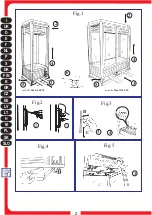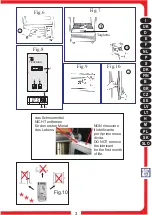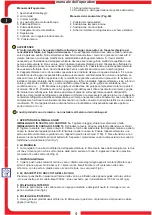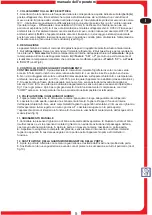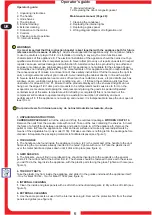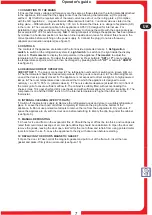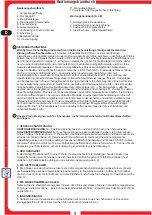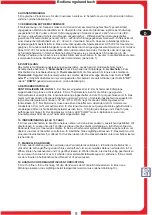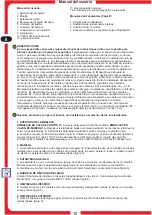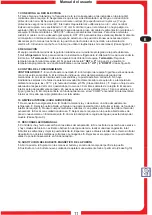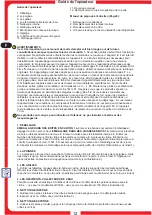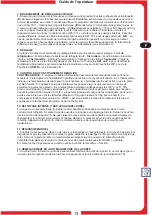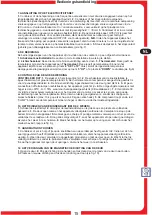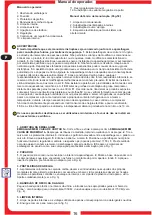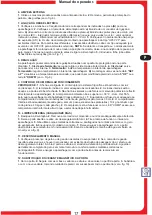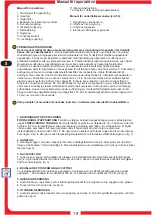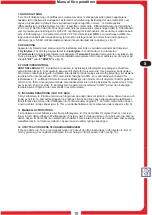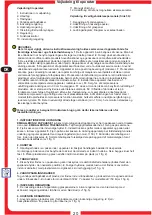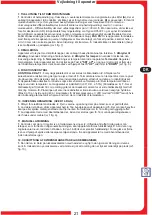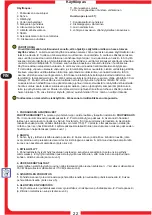
I
UK
D
E
F
NL
P
S
DK
FIN
B
GR
CZ
EE
LV
LT
H
M
PL
SK
SLO
7
Operator's guide
7. CONNECTION TO THE MAINS
1.
(A)
2.
3.
4
N.B
5
8. CONTROLS
1. Refrigeration
switch
2. Light switch:
3. Thermometer:
Thermostat:
a
4
“
SET or P
”
n 5
“
UP
”
6
“
DOWN
”
9. CHECKING CORRECT OPERATION
CHECK THAT: 1.
2
3
4
5.
6.
7
8
9.
10. INTERNAL CLEANING (EVERY 15 DAYS)
1.
2.
3
4
5.
6
7
8
11. MANUAL DEFROSTING
1.
2
3
4.
5
12. REPLACING THE DOOR'S MAGNETIC GASKET
1
2.
3.
Ensure that mains voltage and frequency are the same as those stated on the rating plate
attached
to the appliance.
Ensure that the supply socket has the following characteristics:
Ensure that there is no danger of explosion (AD)
in the room. . The connecting cable to the appliance is H05 VVF, designed for internal use. For
installation in any other environments, it will be necessary to change the cable with the appropriate type
(for example H07 VVF for external use).
. If during transport or storage the appliance has been placed
by mistake in a horizontal position or has been turned upside down, leave for at least three hours in the
correct position before switching on the power supply. . Connect the plug (do not use three-way
adapters and reduction adapters) (see figure 7).
The controls of the appliance are located at the front inside a protected recess.
: to switch on the refrigeration system.
to switch on the light inside the display
cabinet.
to display the temperature in the appliance.
to adjust the
temperature in the appliance. To adjust the temperature: ) Press button
once to display
the temperature set-point, which can then be changed by pressing butto
or button
(see figure 8).
The plug is connected. . The refrigeration unit switch is switched on (green light on).
. The thermometer shows the desired temperature for the goods to be stored. . The internal lights are
on and the door is properly closed.
The appliance is not exposed to direct sunlight or to high-powered
lamps.
The room temperature does not exceed that in which the appliance is designed to work
normally, i.e. +30°C, 55% r.h. (climatic class 4). . There is suitable clearance (at least 30 cm) in front of
the motor grille to ensure sufficient airflow. . The cabinet is suitably filled, without overloading the
shelves (max. 10 kg per shelf and 40 kg per hook) and with sufficient space for cold air circulation.
The
compressor is on and the COMP led is on, if the internal temperature is higher than that set on the
thermostat.
Switch off the electricity supply.
Remove the refrigerated goods and store in a suitably refrigerated
place. . Leave the door open or defrost completely. . Remove the plug from the bottom of the
appliance.
Do not use pointed metal tools to remove the ice from the evaporator. . Dry with care. .
Leave the appliance to dry with the door open before restarting. . Empty the drip tray under the cabinet
(see figure 9).
Check for ice and frost on the evaporator fins. . Should the layer of frost be too thick, and ice drips are
noted that could impair passage of air, complete defrosting should be undertaken. . Open the door and
remove the goods, leaving the door open.
Wait for the ice to thaw and refrain from using pointed metal
tools to remove the ice. . Leave the appliance to the dry with door open before restarting.
. Open the door.
Take hold of the magnetic gasket and pull it out of the frame.
Insert the new
gasket and press it firmly down all around (see figure 10).
a)
b)
c)
it is properly
earthed.
It fulfils the requirements of the rated current as set out on the rating plate.
It complies
with the IEC regulations: - magnetothermal differential switch with In = nominal value as stated on the
rating plate; - Differential with Id sensitivity = 30 mA.


